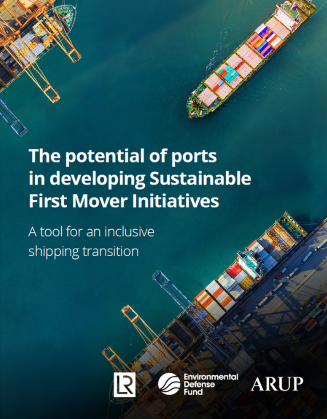
EDF, LR and Arup tool identifies port locations that maximise the environmental and community benefits of first mover initiatives in support of shipping’s energy transition
Lloyd’s Register (LR) Maritime Decarbonisation Hub and Environmental Defense Fund (EDF), in collaboration with Arup, have introduced the Sustainable First Movers Initiative Identification Tool, a system to help shipping stakeholders align investment decisions that support the maritime energy transition away from fossil fuels, LR said in its news release.
The tool, which is presented in a preliminary findings report – The Potential of Ports in Developing Sustainable First Movers Initiatives – scores a port’s potential to produce and bunker electrofuels while delivering local environmental and community benefits in alignment with the global temperature target of 1.5 degrees Celsius set by the Paris Agreement.
“Ports can play an important role in kickstarting shipping’s decarbonisation process even before global policies are established,” said Marie Cabbia Hubatova, Director, Global Shipping at Environmental Defense Fund. “By considering the impact sustainable first mover initiatives can have on port-side communities, climate, environment and economies, resources can be better directed to locations where these initiatives will make the biggest difference.”
With close to two billion people living near coastal zones globally, the role of, and impacts on local port communities must be intentionally considered as the sector decarbonises globally. Ports can play a crucial role in ensuring shipping decarbonisation efforts are done in a way that has positive impacts on port communities. The preliminary phase of the Sustainable First Movers Initiative Identification Tool analyses 108 ports in the Indo-Pacific region according to five criteria including land suitability, air quality, renewable energy surplus, economic resilience and ship traffic.
It is also applied to three different port scenarios, including ports exploring fuel production and bunkering, ports exploring fuel exports, and ports exploring fuel imports and bunkering. The combined criteria and scenario evaluation determines which ports have the greatest potential (‘high potential’) for sustainable first mover initiatives to lead to significant emissions reductions and positive impacts in nearby communities, such as improved air quality and economic resilience.
“The transition to clean energy supply for shipping can be achieved only if stakeholders act together. Identifying potential port locations is the first step in this process,” said Dr Carlo Raucci, Consultant at Lloyd’s Register Maritime Decarbonisation Hub. “This approach sets the base for a regional sustainable transition that considers the impacts on port-side communities and the need to avoid regions in the Global South lagging behind.”
Regions in the Global South are fundamental in driving the decarbonisation of shipping. To make this transition effective, the rate at which different countries adopt and scale up electrofuels must be proportional to the difference in capital resources globally to avoid additional costs being passed on to local communities. Sustainable first mover initiatives can play an important role in making this happen by ensuring the sector’s decarbonisation is inclusive of all regions and by engaging all shipping stakeholders, including port-side communities.
“There’s a huge opportunity for early adopter shipping decarbonisation initiatives to unlock benefits for people and planet – shaping the way for a more equitable transition in the 2030s,” said Mark Button, Associate, Arup. “Our collective approach shows that taking a holistic view of shipping traffic, fuel production potential and port communities could help prioritise action at ports with the greatest near-term potential.”
The tool can be customised according to stakeholders’ needs and goals and is dependent on scenario desirability. The next phase of this work will include the selection and detailed assessment of 10 ports to help better understand local needs and maximise the value offered by sustainable first mover initiatives.
LR and EDF carried out a joint study on ammonia as shipping fuel, and LR and Arup have collaborated on The Resilience Shift study focused on fuel demand for early adopters in green corridors, ports, and energy systems, amongst many other projects.



